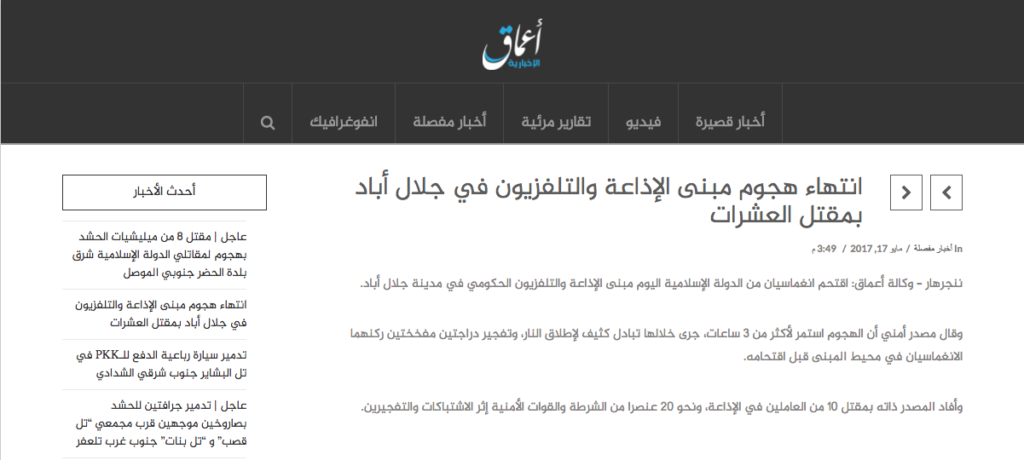
A team of several jihadists raided the offices of the National Radio Television of Afghanistan (RTA) in Jalalabad, the capital of Nangarhar province, earlier today. The assault was quickly claimed online by the Islamic State.
Citing local officials, TOLOnews reported there were “five attackers in total,” one of whom blew himself up. Three others were killed in a firefight and “the fifth was arrested.” The siege lasted approximately three to four hours. According to Reuters, initial casualty reports indicate that at least six civilians were killed and two dozen others wounded.
The Islamic State issued a statement of responsibility via its Amaq News Agency as the siege was ongoing, then a separate message online, followed by an update on Amaq’s website (seen above).
The group claims the death toll was much higher than independent reporting indicates and other minor details differ as well. The Islamic State says “approximately 30 from the murtadd [apostate] Afghan media and security personnel” were “killed” in the “inghimasi operation.” Inghimasis are well-trained guerrilla fighters who immerse themselves in battle and are willing to blow themselves up.
The Islamic State identifies two of its “inghimasi soldiers” by their aliases, Abu Ibrahim al-Khurasani and Abu ‘Aishah al-Khurasani, and says they “attacked the TV station of the murtadd [apostate] government in Jalalabad.” The pair “parked their explosive motorcycles near the building before they detonated them on two gatherings of the murtadd Afghani police and security personnel.”
Other “inghimasi brothers” then “entered into the building and attacked the murtaddin inside it for three continuous hours,” according to the Islamic State’s claim.
Wilayah Khorasan (the Islamic State’s Khorasan “province”) has controlled territory in Nangarhar, but its safe havens have shrunk since early 2016. The US is leading a counterterrorism operation against the group, which currently controls all or parts of a handful of districts in Nangarhar. At its peak in late 2015 and early 2016, Wilayah Khorasan controlled upwards of ten districts.
The jihadists have not given up ground easily. Three American service members died during two counterterrorism raids in Nangarhar in April. The emir of Wilayah Khorasan, Abdul Hasib, met his demise during the second American-led operation on Apr. 27.
Even as its grip on territory has slipped, however, Wilayah Khorasan has launched a string of high-profile attacks in Afghanistan.
For example, in Jan. 2016, Wilayah Khorasan claimed responsibility for an inghimasi assault on the Pakistani consulate in Jalalabad. Several members of Afghan security forces were reportedly perished.
In early March, an Islamic State inghimasi squad raided the Sardar Mohammad Daud Khan Hospital, killing or wounding dozens of people. The hospital serves military service members and their families in Kabul, the Afghan capital.
On May 3, an Islamic State jihadist detonated his vehicle-borne improvised explosive device (VBIED) near a security checkpoint in Kabul, close to where the US Embassy is located. The bombing targeted a NATO convoy. At least eight civilians died from the blast and three coalition service members were also wounded.
For additional background information on Wilayah Khorasan, see FDD’s Long War Journal report: 2 American service members killed fighting Islamic State in eastern Afghanistan.







